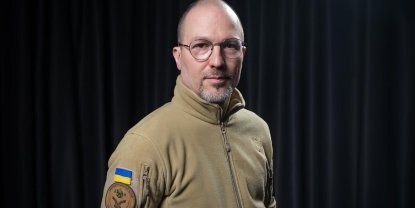Thousands of Ukrainian soldiers and civilians are held in Russian captivity. The exchange process has recently moved forward: 230 Ukrainian prisoners of war returned home for the first time since August 2023.
Petro Yatsenko, the head of the press service of the Coordination Headquarters for the Treatment of Prisoners of War, told online.ua how the Russian side use Ukrainian prisoners of war to exert psychological pressure on their families, whether it is right to ban Russian prisoners of war from calling home after Russia deprived Ukrainian prisoners of war of this right, and what is known about the so-called ‘Bohdan Khmelnytsky’ battalion, allegedly formed from Ukrainian soldiers, who had been captured by Russia, and thus forced to fight their compatriots.
The interview was recorded a few hours before the largest full-scale prisoner of war exchange in history on 3 January 2024, when Ukraine returned home 230 of its defenders.
Ukrainian prisoners of war are psychological weapon of Russia
Ukrainian prisoners of war are being used as a psychological weapon. You said that every second Ukrainian family receives calls from their fathers, husbands and sons who are in Russian captivity, and that the latter are forced to tell their relatives to come out to rallies against the Ukrainian authorities. Do these calls continue?
The calls started in 2022, but they were not so frequent back then. Every Ukrainian family whose relatives are in Russian captivity can receive such a call or message.
Ukrainian prisoners of war have the same narrative when they are allowed to call their families. So we understand that this is an organised campaign.
The narrative is that “Russians are ready to exchange me, but apparently Ukraine does not want me to be released. You have to put pressure on the authorities, you have to take some action, you have to resort to mass rallies [against Ukrainian government]”.
During Russia’s constant postponements of prisoner of war exchanges, these calls continued on a massive scale.
We often have group meetings with families whose loved ones are in Russian captivity at the Coordination Headquarters, and witness them receiving these phone calls.
These are very emotional moments. We see mothers, wives and daughters of Ukrainian prisoners of war speaking to their beloved ones and crying, and we understand their pain.
Russians know our Ukrainian mentality. They know that if there is a problem, Ukrainians get together, organise rallies and protests. The problem is widely covered in the media, becomes public and is solved — this is a normal thing in a democratic society.
However, this does not work when we are provoked by an aggressor country with totalitarian rule.
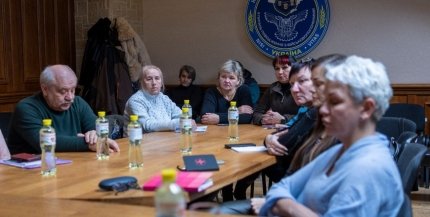
For most people, especially for the relatives of Ukrainian prisoners of war, this is a very difficult situation. What does the Coordination Centre do to ease their situation?
We do everything possible to help the relatives to cope with this difficulty. And one of the most important things is to provide them with psychological assistance.
Our psychologists often faces a paradoxical situation when a family begins to blame their relative, released from captivity, for his/her suffering. This is unacceptable.
We are working to ensure that families understand what is happening. We want them to know how to help themselves first and foremost.
We ask those who survived the Russian captivity and returned home: “What do you expect from your family?”
And they all say they would feel so much better if they feel they are loved and supported by their families.
We must awaken our inner resources and cope with the difficulty. And relatives of soldiers who are missing and whose fate is unknown must believe that one day they will receive a phone call and hear the voice they know so well saying: "It's me! I am alive! I am free!".
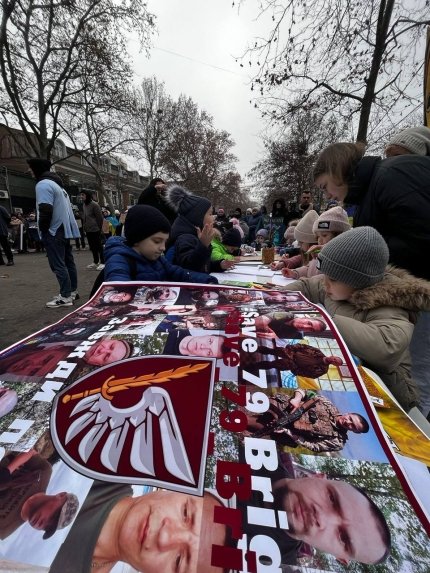
Every Ukrainian family is doing its best to find their loved ones as Russia provides little information about captured Ukrainian prisoners of war. Many families do not even know if their loved ones are alive.
There are cases when families turn to the media and ask for help in finding their loved ones whose fate is unknown. They bring photos of their husbands and sons. They show these photos to journalists, saying: "He is a good soldier, he fought in the ATO, he destroyed a Russian tank, he is a sniper...".
But such actions can seriously affect Ukrainian prisoners of war and worsen their situation in Russian captivity.
I see the cases like that are becoming fewer and fewer. This is good. This shows that Ukrainians are beginning to realise what can be done and what should not be done.
Russia does not understand pleas, Russia does not understand tears. It understands the language of force, the language of pressure.
Certainly, we must not sit idly by. We should focus our efforts on work with the external audience in European countries.
We see that the international community is beginning to forget that there are Ukrainians doomed to live in horrific conditions of Russian prisons and in the temporarily occupied territories of Ukraine.
It is hard for those people to be there. They suffer. This applies to captured civilians as well as military personnel.
How our friendly countries can help us? Sanctions, diplomatic pressure, economic pressure — the only language that the aggressor country understands.
Is it possible to prohibit Russian prisoners from calling their relatives?
Continuing the topic of calls: on the eve of the New Year, a petition appeared to prohibit Russian prisoners of war from calling their relatives. How fair do you think this move is?
Ukraine has signed the Third Geneva Convention and it was a step forward. We said that we would allow Russian prisoners of war to communicate regularly with their relatives via IP telephony.
All of them have the opportunity to call home and say that “I am in captivity, my personal account is such and such, and you can, for example, send me money”.

This is the goodwill of Ukraine and our country pays quite a lot for these calls, because these calls are quite expensive.
We hoped that Russia would allow Ukrainian prisoners of war to contact their relatives. And it eventually happened but in a very perverse way. These are not calls and a normal conversation. This is propaganda.
We do not need this, and it is logical that the Ukrainian society became outraged. Of course, we are free to respond the same way and ban the Russian prisoners of war from calling their relatives. But we will achieve nothing if we act like Russia does.
We fulfil everything that is written in the Geneva Conventions. We do it at a very good level. This is evidenced by the International Committee of the Red Cross and journalists, both international and Ukrainian, who visit and see what conditions we have for Russian prisoners of war.
"I WANT TO FIND" project for families of captured occupiers
And in general, how is this perceived inside the camp?
We are open to Russian families who want to find their relatives in captivity, and ready to help them. We work with Russian volunteers on this project.
This project is called "I Want to Find". It is an opportunity for Russian mothers and wives to find their loved ones and talk to them.
In fact, most of Russians are absolutely cynical people who understand perfectly well what is happening. And most of them go to war not for an idea, but for money. Just for money.
When, for example, St Nicholas comes to Russians in captivity on Christmas Day, we understand that we are showing our traditions, our humanity. But can these really break through and awaken something human in them after decades of brainwashing by Russian propaganda?
However, this is not our task or a mission to give the Russian prisoners of war an opportunity to realise something. This is a very complex task that requires a lot of resources. We don't need it.
Once I spoke to two of Wagner's mercenaries who had been captured. They were young men. They were recruited in one of the Russian prisons, in the depths of Russia. They actually spent half their lives in prison.
And when I asked them about their experience in Ukraine, hoping it had changed something in them, they only laughed, and one of them said that Ukrainian captivity "was like a holiday in Europe for him".
Russian prisoners of war are treated in accordance with the Geneva Conventions, unlike the Ukrainians in Russian captivity.
Some Ukrainians believe that this is unfair and that Russians should be put in the same terrible conditions as Ukrainians are in Russia.
But it is important to realise that in this case we will achieve nothing.
Our main goal is not to keep the Russian POWs, we don't need them. Our main goal is to exchange them as soon as possible.
Will captured Russians be involved in reconstruction of Ukraine?
Currently, many Russian soldiers are voluntarily surrendering to Ukrainian captivity. Our state has to spend money on their maintenance. Are there any plans to provide them with work? For example, to engage them in the reconstruction of bombed-out Ukrainian towns and villages?
In fact, this idea is a bit in the air. We know that some German prisoners of war took part in the reconstruction of some Ukrainian cities after the Second World War.
But Russian prisoners of war are simply not suited for such work, and the quality of such construction can be very questionable. Involving them in rubble removal is also problematic.
There are also other issues like security issues, food issues. This idea is unlikely to be implemented due to a number of specific requirements.
So far, most of them can only be entrusted with furniture weaving.
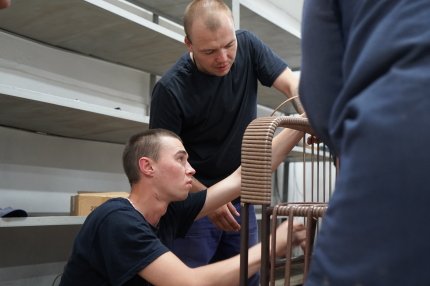
We also have other jobs for them, such as camp manager, sawmill worker, baker, carer for seriously wounded, etc.
We are ready to actually capture and detain all Russian servicemen who want to surrender. We will find job opportunities for them and accommodation.
Everyone who surrenders saves lives of Ukrainians. If the conditions in Ukrainian captivity were terrible, they would not surrender.
We give business cards to those we send on exchange. The cards say: “You already know what our conditions are like. If you are sent back to the front, here is a contact. Just call, surrender, and you will end up in the same camp.” I think this is a great motivation.
Some Russian soldiers who saw videos showing Ukrainians being tortured by Russians are afraid to surrender.
Such soldiers think of something like this: “If our people treat them like this, then when I am captured, they will treat me the same way. Or even worse. My commander tells me that it is better to blow myself up with a grenade than to surrender. Well, I will do so.”
How negotiations on exchanges are conducted with Russia
We have a Coordination Headquarters for the Treatment of Prisoners. In Russia, as far as I understand, there is no such structure at all. How difficult is it to communicate with this country and how good enough is the dialogue with them?
It is hard and unpleasant. And negotiating with such an opposing party is always very difficult.
Therefore, each exchange is a unique success of our entire society. All the people of the Coordination Headquarters, all needed specialists and government agencies are involved.
This is a complex process that have to be handled by professionals.
We need at least 100 and preferably 200 Ukrainians to return home every month. It is most desirable, of caurse, that they all return as soon as possible.
We must understand that no matter how inhuman the Russian authorities are, we continue to work and negotiate with them on the exchange of prisoners
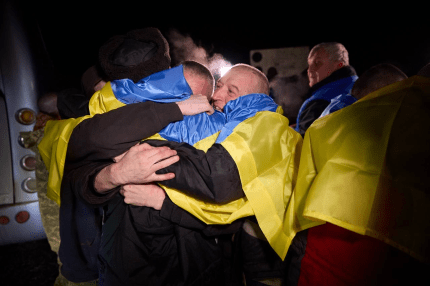
Involvement of international organisations
As far as I understand, international organisations are another channel of communication, but they are not currently trying to actively intervene in these processes for fear of damaging exchanges. But in the end, how big is the influence of, for example, the Red Cross?
We would be very grateful to any international organisation that would intervene, or an international government or a third country involved in these negotiations that would step in and help.
Until now, all the exchanges that have taken place have been possible only thanks to the work of Ukraine alone.
Some international organisations from Turkey, Saudi Arabia, Poland and other countries contributes to the process as much as they can.
These countries took part in one of the largest exchanges, when 215 Ukrainians returned home. However, all negotiations and efforts had been carried out by Ukrainian state institutions.
The International Committee of the Red Cross (ICRC) has its own mandate. We would like it to work more actively on the territory of Russia, because here it has full access to the vast majority of places of detention.
Russians have more than 100 places of detention throughout their own territory and in the temporarily occupied territory of Ukraine.
Unfortunately, the Red Cross does not have access to all these detention places. We would like them to be more proactive in demanding this access and assistance.
They can work with those countries that more or less comply with international law. Russia is not one of them so they are simply do not know how to procced in such a case.
They are faced with a situation where Russia, having allegedly signed all the documents, refuses to implement them in any way. And this is a real challenge for everyone.
They seem to be trying to interact somhow using their protocols, but these attempts do not work.
If Russia agrees to an "all for all" exchange
What about creating a platform like the Istanbul Convention? Are there any such ideas?
Again, this is a matter of desire. For example, we receive a proposal that the Russian side is ready for such an exchange.
We are ready for such an exchange. We would need a few days to organise the departure of all Russian prisoners of war to the place they came from.
The problem is that the Russian side does not want something like that. We do not need Russian prisoners of war in Ukraine.
These people have to be returned to where they came from. We need our citizens back.
Ukrainian civilians in Russian captivity
In addition to military personnel, we have a significant problem with civilians who are being illegally held captive by Russia and passed off as prisoners of war. How can they be exchanged? According to international conventions, this is generally prohibited.
The word "exchange" is not appropriate here. We have to catch Russian civilians somewhere to be able to exchange them for Ukrainian civilians captured by Russia. This road leads nowhere. And we are definitely not going to do that.
The problem is actually huge. Because there are many civilians who have been captured and imprisoned by Russia.
Russia does not have any legal grounds to keep them in prison. Russians accuse Ukrainian civilians of obstructing the so-called 'special military operation', and invent even more ridiculous reasons to justify the illegal detention of Ukrainians.
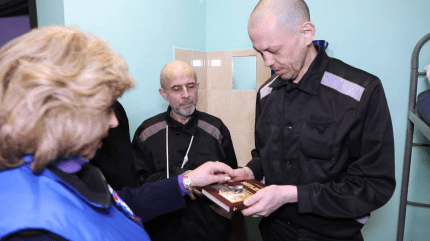
We know cases when Russians detain Ukrainians and then release them without documents, without means of subsistence. These people are not able to leave Russia or the temporarily occupied territories for the Ukrainian government-controlled territory.
Initially, Russians tried to exchange Ukrainian civilians for their military. It cannot be an option, of course.
There are many Ukrainians living in the occupied territories. Anyone can be seized and exchanged. This is absolutely not an option. An international pressure is important here.
Many people in the West also understand who they are dealing with. But this does not make it easier for Ukrainians.
So far, we have managed to release more than 140 civilians. We did not exchange them for military personnel.
I want people to know that regardless of whether it's a soldier or a civilian imprisoned by the Russians, we know about them all and we will get them out.
What were the cases of manipulation of civilians by Russia?
The Russians have always used both civilian hostages and prisoners of war in a very sophisticated way.
We witnessed Russians allegedly releasing civilians, whom they had held captive, filming it. Doing so, Russians would say to the camera: “Here is a checkpoint on the border with the occupied territory. And now we are releasing you on camera, go to all four sides.” And these people seemed to be going somewhere, and then these people did not return to any territory controlled by Ukraine.
We understand that this video was a kind of justification for Russians. That is, they are absolving themselves of any responsibility. But “released” Ukrainians most likely end up in a Russian prison again. This is one of the aspects of how Russians behave and what they do. And this is not the worst case. That is why publicity is very important here.
Similarly, in the West, we participate and help those civilians and civic activists who are trying to remind the West that Ukrainian civilians are in captivity.
That's why we try to help all the initiatives that exist in the West. We make big posters, organise actions. Posters with the faces of civilians illegally detained by the Russians. We try to tell their story, to show that this is a living person, not just a photograph or a name.
We tell the world about the civilians, Ukrainian journalists, whose human rights are being violated by Russia's illegal captivity and actions.
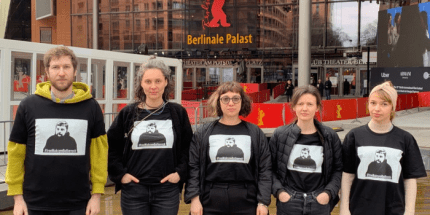
The Russian system is a system bent on torturing people. They seek to cause as much suffering as possible.
We have to understand the bigger picture. In this war there are those who are captured and there are sadists who came to satisfy their perverted needs. These monsters are using prisoners of war either as human shields or make them walk across mined areas.
In this way they want to discourage the civilian population of Ukraine from helping the Ukrainian army and from engaging in public activities.
Battalion named after Bohdan Khmelnytskyi is failed Kremlin fake
Recently, Russian propaganda has come up with a new claim that the 'Bohdan Khmelnytsky Battalion', which consists of Ukrainian prisoners of war, is allegedly fighting for the first time at the front. What can you tell us about this battalion?
In fact, the history of this so-called battalion began more than a year ago. Now Russians have turned to this topic again.
They claim that this so-called battalion has managed to recruit allegedly 70 Ukrainian prisoners of war... And we do not know whether this figure is true.
To what extent is it negative that people are looking for relatives of Ukrainian soldiers who have been captured or gone missing on social media or in groups? We often see campaigns in support of the Azov soldiers, to what extent does this have a positive or negative effect?
First, regarding Azov. There are public organisations created by the Azov defenders families. The Coordination Headquarters always advises families to organise themselves and create groups, because it is easier to defend their interests and receive information.
Group meetings are held where people have common questions. And it's much better when twenty, thirty or fifty people who have a common interest come there and get answers than when everyone goes individually.
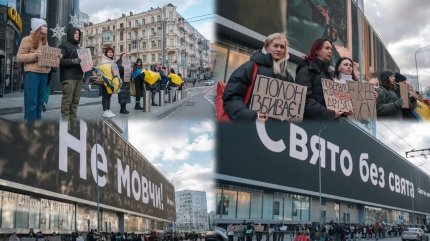
It is fundamentally important for us that this is our compatriot. We do not trade lives. This is our defender. He must be released.
Together, we do important work and this allows us not to be in constant tension.
We see something similar happening in Israel, where civilian hostages are also being taken. There, society is also taking action to remind that it is nessesary to save these people.
Message for Ukrainians and whole world
We all understand that most Ukrainians have one wish for the New Year. And we will believe that this year will be successful and ultimately victorious. But I would like to hear your message to Ukrainians and the world. What is important to remember today?
We want as many families as possible to hear a voice speaking the simple words that are so important for them to hear. These are the families of prisoners of war and missing persons. These simple words are “I am alive”, “I am free”. And we are working hard to make it happen and for the sake of this moment.
At first, Russians tried to exchange Ukrainian civilians for their military. But this is not an option, because there are many Ukrainians living in the occupied territories.

